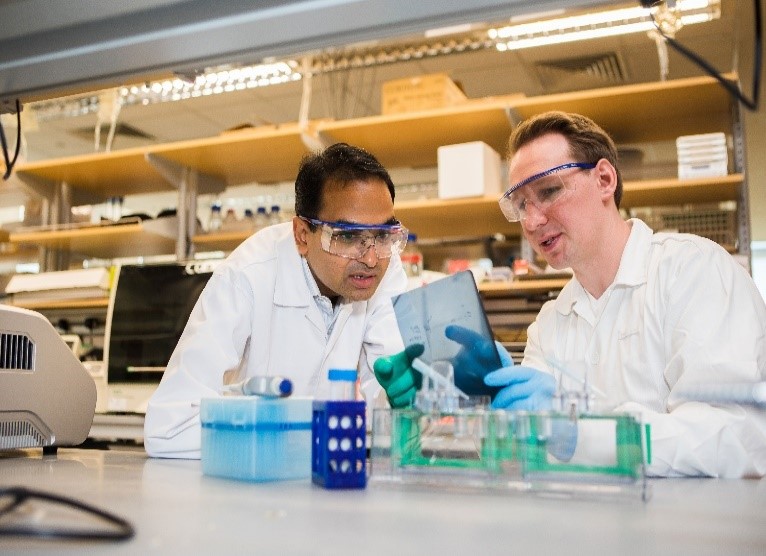Dr Anand D. Jeyasekharan
MBBS, PhD (Cantab), MRCP (UK), FAMS (Medical Oncology)
My journey
I completed my undergraduate medical degree from Christian Medical College Vellore, India (2003). I then received a Gates Cambridge Scholarship towards a PhD in Oncology (2008) at the University of Cambridge UK (Gonville and Caius College), under the mentorship of Professor Ashok Venkitaraman. Following a stint as a Junior Research Fellow at Wolfson College Cambridge, I joined the National University Hospital (NUH) Singapore in 2010, to complete specialist training in Internal Medicine and Medical Oncology.

I started up my laboratory at the Cancer Science Institute (CSI) during my oncology training period, through an NMRC CS-NIG, as well as NCSP, NCIS and SGCC funding. Afterwards, I obtained an NRMC CS-Transition Award, and was appointed as a Principal Investigator at CSI and Assistant Professor at the Dept of Medicine, Yong Loo Lin School of Medicine, NUS. My clinical interest is in aggressive B-cell neoplasms, and I am a currently a consultant on the NUH lymphoma team. I work with the Clinician-Scientist Unit at the NUH and administer the NUH Clinician-Scientist Program for Residents (NCSP-R). I am also currently the assistant director for research at the NCIS (Med Onc) and represent NUS at the Singapore Translational Cancer Consortium (STCC).
Why I do science and medicine
As I child I loved sci-fi and wanted to be an intergalactic explorer. However, reading about molecular biology opened my eyes to the exploration possible in the microscopic world of a living cell, which then drew me to medicine. It an opportunity to explore the unknown, with the aim of overcoming human disease. Cancer fascinated me the most during my undergraduate period, and I continued studying it through a PhD in Oncology and clinical speciality training. I am privileged to have a job that allows me to work with enthusiastic students/ post-docs on understanding the cellular basis of cancer, while simultaneously being allowed into the lives of patients and their families during their journey with this disease.
What is my research
My lab works on how cancer cells are cleared by the immune system after exposure to chemotherapy. This interest stems from 2 key observations:
1. Cancer cells are defective in DNA repair, and this generates immunogenic nucleic acids/ peptide neo-antigens
2. Genotoxic chemotherapy increases these immunogenic molecules, and activates innate and adaptive immune responses
We hypothesize that intracellular changes in cancer differentially affect the ability of distinct chemotherapeutics to result in immune clearance of tumours. Identifying regulatory components of this response will be important to design rational immunotherapy/ chemotherapy combinations for cancer treatment.
What do I propose to do for the rest of my career
Continue working on the phenomenon mentioned above, and work with lymphoma patients and their families! Success to me would be walking this path as well as I can: administering appropriate care to my patients, rigorously evaluating scientific data, helping students find their potential, and hopefully discovering something useful.
The importance of a good mentor and how my mentor has supported me
I’ve been lucky to have many mentors at different stages in my career. I learnt how to approach scientific questions initially from Prof. JP Muliyil (Epidemiologist and former Principal, CMC Vellore) and then from Prof. Ashok Venkitaraman during my PhD. In Singapore, my first mentor was Prof. Phillip Koeffler (a senior clinician-scientist at CSI/NCIS and STAR awardee). Even though Phil disliked the term “mentor”, he was my sounding board for research ideas, opened his lab to house my research program, and helped edit my first grant and paper. Perhaps the biggest contribution though was giving me confidence as a young researcher to set up my lab while still training as an oncologist. If an accomplished cancer biologist thought I was capable, perhaps I could actually do this?
Learning from multiple mentors helps develop a unique scientific identity. Profs. Chng Wee Joo, Allen Yeoh, Yeoh Khay Guan, Goh Boon Cher and Lee Soo Chin have each helped me learn how to balance different components of the life of a practicing clinician-scientist, and supported my efforts in trying to do so. It is a privilege to be involved with Clinician-Scientist Unit and the CS academy to pay this forward.

